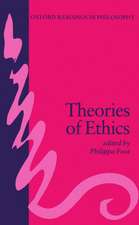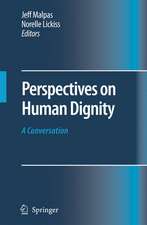Ethics and Self-Knowledge: Respect for Self-Interpreting Agents: Library of Ethics and Applied Philosophy, cartea 26
Autor Peter Lucasen Limba Engleză Paperback – 2 aug 2013
| Toate formatele și edițiile | Preț | Express |
|---|---|---|
| Paperback (1) | 636.63 lei 43-57 zile | |
| SPRINGER NETHERLANDS – 2 aug 2013 | 636.63 lei 43-57 zile | |
| Hardback (1) | 642.18 lei 43-57 zile | |
| SPRINGER NETHERLANDS – 22 iun 2011 | 642.18 lei 43-57 zile |
Din seria Library of Ethics and Applied Philosophy
-
 Preț: 429.22 lei
Preț: 429.22 lei -
 Preț: 389.70 lei
Preț: 389.70 lei -
 Preț: 184.53 lei
Preț: 184.53 lei - 15%
 Preț: 647.40 lei
Preț: 647.40 lei - 15%
 Preț: 641.71 lei
Preț: 641.71 lei - 18%
 Preț: 951.47 lei
Preț: 951.47 lei - 18%
 Preț: 952.89 lei
Preț: 952.89 lei - 15%
 Preț: 645.79 lei
Preț: 645.79 lei - 15%
 Preț: 637.13 lei
Preț: 637.13 lei - 15%
 Preț: 644.95 lei
Preț: 644.95 lei - 15%
 Preț: 645.47 lei
Preț: 645.47 lei - 18%
 Preț: 895.76 lei
Preț: 895.76 lei - 18%
 Preț: 959.67 lei
Preț: 959.67 lei - 15%
 Preț: 642.68 lei
Preț: 642.68 lei - 15%
 Preț: 642.51 lei
Preț: 642.51 lei - 15%
 Preț: 640.71 lei
Preț: 640.71 lei - 15%
 Preț: 642.68 lei
Preț: 642.68 lei - 15%
 Preț: 635.01 lei
Preț: 635.01 lei - 15%
 Preț: 638.43 lei
Preț: 638.43 lei - 24%
 Preț: 783.26 lei
Preț: 783.26 lei - 15%
 Preț: 634.18 lei
Preț: 634.18 lei - 15%
 Preț: 638.57 lei
Preț: 638.57 lei - 15%
 Preț: 635.47 lei
Preț: 635.47 lei - 20%
 Preț: 565.64 lei
Preț: 565.64 lei - 15%
 Preț: 644.82 lei
Preț: 644.82 lei
Preț: 636.63 lei
Preț vechi: 748.97 lei
-15% Nou
Puncte Express: 955
Preț estimativ în valută:
121.86€ • 132.41$ • 102.43£
121.86€ • 132.41$ • 102.43£
Carte tipărită la comandă
Livrare economică 21 aprilie-05 mai
Preluare comenzi: 021 569.72.76
Specificații
ISBN-13: 9789400736580
ISBN-10: 9400736584
Pagini: 220
Ilustrații: XII, 208 p.
Dimensiuni: 155 x 235 x 12 mm
Greutate: 0.31 kg
Ediția:2011
Editura: SPRINGER NETHERLANDS
Colecția Springer
Seria Library of Ethics and Applied Philosophy
Locul publicării:Dordrecht, Netherlands
ISBN-10: 9400736584
Pagini: 220
Ilustrații: XII, 208 p.
Dimensiuni: 155 x 235 x 12 mm
Greutate: 0.31 kg
Ediția:2011
Editura: SPRINGER NETHERLANDS
Colecția Springer
Seria Library of Ethics and Applied Philosophy
Locul publicării:Dordrecht, Netherlands
Public țintă
ResearchCuprins
Preface Fragmentation.-
1.1 Respect for persons, and persons as ends.-
1.2 The essence of ‘respect for persons’.-
1.3 Contemporary challenges.-
1.3.1 The problem of integration.-
1.3.2 The problem of ‘personhood’.-
1.3.3 The problem of Objectification.-
1.4 The aftermath.-
2. Discrimination.-
2.1 Introductory remarks.-
2.2 Discrimination and procedural unfairness.-
2.3 Discrimination and intentionality.-
2.4 Discrimination as an interpretive moral wrong.-
3. Stereotyping.-
3.1 A potential counterexample.-
3.2 Injustice and stereotyping.-
3.3 Ideological stereotyping.-
4. Objectification.-
4.1 Introduction.-
4.1.1 First stage objectification: instrumentalisation.-
4.1.2 Second stage objectification: adoption of alien ends.-
4.1.3 Third stage objectification: ‘Reduction’ and reflection.-
4.2 Objectification as an interpretive moral wrong.-
4.3 Objectification, stereotyping and scientific self-knowledge.-
4.3.1 Marx and commodification.-
4.3.2 Objectification in genetic research
5. Recognition.-
5.1 Hegel on recognition.-
5.2 Dignity and universal self-consciousness.-
5.3 Essentialism and political liberalism.-
6. Inauthenticity.-
6.1 Liberalism, essentialism and positivism.-
6.2 Phenomenological essentialism.-
6.3 Dasein, intelligibility and alienation.-
6.4 Inauthenticity and objectification.-
7. Sadism.-
7.1 Duality andIntentionality.-
7.2 Being-with-others, the ‘look’.-
7.3 Modes of instrumentalisation.-
7.3.1 Indifference.-
7.3.2 Love, and love’s fragility.-
7.3.3 Sadism and sexual desire.-
7.4 Non-complementarity.-
8. Subjection.-
8.1 Knowledge, power and recognition.-
8.2 Self-knowledge and the abuse of power.-
9. Honesty.-
10. Conclusion and implications.
Textul de pe ultima copertă
This book explores the theoretical basis of our ethical obligations to others as self-knowing beings - this task being envisaged as an essential supplement to a traditional ethic of respect for persons. Authoritative knowledge of others brings with it certain obligations, which are reflected in (inter alia) the moral and legal safeguards designed to ensure that certain information is ‘put out of play’ for job selection purposes etc. However, the theoretical basis for such obligations has never been fully clarified. This book begins by identifying a distinctive class of ‘interpretive’ moral wrongs (including stereotyping, discrimination and objectification). It then shows how our obligations in respect of these wrongs can be understood, drawing on insights from the tradition of philosophical reflection on recognition. The book will be of interest to anyone concerned with the adequacy of a modern ethic of respect for persons – particularly in applied and professional ethics.
Caracteristici
Makes an original contribution to knowledge, in an area of ethical theory which is of long-standing interest and theoretical concern. Provides an accessible introduction to key primary sources in the field. Complements recent titles in the field (such as Honneth's Disrespect, and The Struggle for Recognition, and Taylor's Multiculturalism and the Politics of Recognition)















